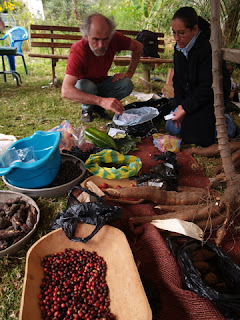The event was down in a valley just outside Quito. I started the afternoon feeling depressed after foolishly deciding I'd do some alternative tourism and spend my morning wandering around two of the towns in the valley. They were both strung along a main road thick with traffic and fumes, and flanked by a characterless strip of Kentucky Fried Chickens, McDonalds, Supermaxis (Tesco equivalent) and other chain stores. Once you got off the main road there were huge expensive houses with correspondingly huge dogs and even huger gates - the rich commuter belt for Quito.
But, a wander up a long dusty track took me out of the town to a a totally different world (a bit like stumbling upon Redhall walled garden for any Edinburgh folk). There were traditionally built adobe wood frame houses and trees covered in grapefruits and a buzzing gathering of people from all over Ecuador who had bought baskets of seeds to exchange, all lovingly saved, dried, wrapped and labelled.
As the afternoon went on people organised themselves into stalls from the different areas of the country and set out little displays. People wandered round asking questions and getting to taste weird and wonderful fruits and vegetables and learn about unfamiliar seeds.
My favourite was the aerial potato which looks like an angular potato, and apparently tastes quite like one, but grows in the jungle hanging from creepers.
I did some interviews with the farmers their about why they save seeds and heard some sad stories about the local crops which have now disappeared because people have lost the practice of saving seeds and market pressures and bribes/incentives from agribusinesses have started them on the path of buying hybrid seeds.
There were also lots of hopeful stories though about how people are now grouping together to improve things and it was amazing to see so many people getting enthusiatic about little hand-wrapped envelopes of seeds carefully labelled with the date, altitude and variety.
The interviews will hopefully be used as part of Progressio's campaign against terminator technology, the GM suicide seeds which are modified to be sterile, preventing farmers from being self sufficient by collecting seeds to sow next year, and ensuring that they become dependent on big agricultural companies.
 It's great to think of little pockets of enthusiastic people tucked away behind the Kentucky Fried Chickens working on alternatives and protecting what they have.
It's great to think of little pockets of enthusiastic people tucked away behind the Kentucky Fried Chickens working on alternatives and protecting what they have.










